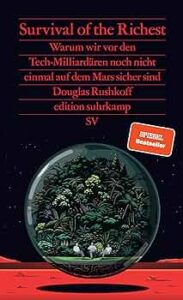Discover Books
Cognitive Critique | Society Through the Lens of The Brain
How we think shapes how we live. Our perceptions, biases, and emotions are not just personal—they are deeply embedded in the social structures we create. This section explores books through the intertwined perspectives of neurophysiology, psychology, and philosophy, revealing how our brains drive the world we build.
From the neural roots of fear and power to the philosophical implications of free will and control, these critiques uncover the hidden forces shaping society. By examining literature through a cognitive lens, we question not only the narratives we read but also the ones we unconsciously live by.
 Survival of the Richest – Douglas Rushkoff
Survival of the Richest – Douglas Rushkoff
“A sharp and urgent analysis of how the ultra-rich are preparing for the apocalypse rather than preventing it.”
— Naomi Klein, Author of The Shock Doctrine
🌍 Theme: Wealth inequality, technological dystopia, survivalism, social critique
🛒 Buy here
📖 Summary
Douglas Rushkoff’s Survival of the Richest is more than an exposé of Silicon Valley’s elite—it is a psychological study of control, fear, and detachment. Through firsthand encounters with billionaires seeking personal escape plans rather than collective solutions, Rushkoff reveals a striking paradox: those with the most power are often the most afraid.
Their obsession with technological dominance, AI-driven immortality, and fortified bunkers is not a display of confidence but a symptom of insecurity. Neuroscientific research supports this—extreme power can dampen empathy, reinforce fear-based decision-making, and drive compulsive control-seeking behavior. Yet, as Rushkoff illustrates, the more they try to dominate uncertainty, the more they become prisoners of their own fear.
This book is not just about the ultra-rich; it is a reflection of a universal struggle. While we may not hoard wealth, we cling to identities, relationships, and social validation in a quieter attempt to engineer security. But control is an illusion—whether in a billionaire’s underground bunker or in our own daily lives.
Rushkoff’s critique is a call to rethink our relationship with power, uncertainty, and survival itself. Meister Eckhart once wrote that true freedom is found not in accumulation, but in surrender. If Survival of the Richest leaves us with one lesson, it is this: the way forward is not through fear-driven control, but through embracing our interdependence, our vulnerability, and the reality of being human.
💡 Why Read It?
| Cognitive Bias & Power The book reveals how wealth shapes perception, reinforcing detachment from social responsibility
| Neuroscience of Fear & Control Rushkoff’s insights align with research on threat perception and survival instincts
| Ethics of Technology A crucial reflection on whether tech advancements serve humanity or deepen inequality
| Thought-Provoking & Urgent Challenges readers to rethink the role of innovation in shaping our future
